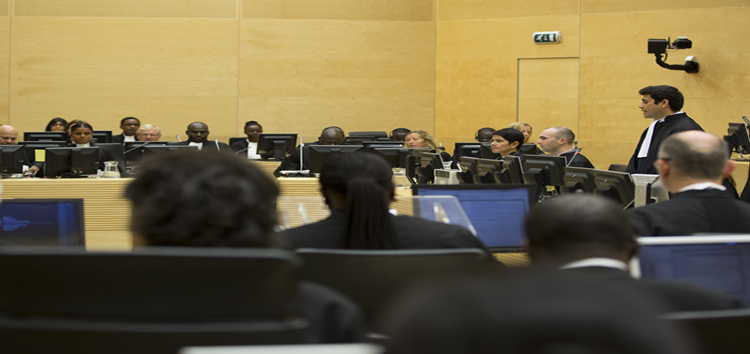Senegalese Justice Minister Sidiki Kaba is among those who issued the statement.
Over 30 ministers of nations around the world – five of them African — have vowed to protect the International Criminal Court from unfounded and unconstructive denunciations.
In a statement issued at the opening of the institution’s permanent premises in The Hague this week, the informal network of ministers of State Parties to the Rome Statute said the political criticism against the court was a measure of relevance because it targets influential perpetrators of serious crimes.
The ministers said they were proud supporters of the ICC, which they added embodied their collective commitment to fight impunity for the worst crimes under international law.
“The opening of the permanent premises sends the unequivocal message of permanence: the ICC is here to stay – as an independent judicial institution with increasingly universal reach,” the ministers said in their statement.
They added that the ICC had changed the dynamics in international relations and is the most important step forward in the development of international law; and was serving as a warning sign to those considering committing the worst international crimes.
“It is the centerpiece of a system created to make sure that no one stands above the law. For decades, the idea of a permanent international criminal court was considered utopian. After the adoption of the Rome Statute in 1998, many believed that the Court would never start operating or hear a case. We have come a long way, and the idea of international criminal justice has prevailed,” their statement said.
“This is why we also have to pledge our commitment today to give political support to the Court, to provide it with the means necessary to carry out its works, to cooperate fully with the Court, especially in the execution of arrest warrants,” the statement said, in apparent reaction to the declaration by Kenyan President Uhuru Kenyatta that no Kenyan would go to the ICC despite the existence of three warrants of arrest.
Uganda’s Attorney General as well as the foreign ministers of Lesotho, Tunisia and Botswana together with Senegalese Justice minister Sidiki Kaba are part of the network members who issued the statement. Mr Kaba is also the President of the Assembly of States Parties.
“Potential perpetrators know that there is no impunity for the worst crimes under international law. Politicians know their obligation to provide for accountability in national courts. Most importantly, victims know that there is a judicial institution in The Hague set up to fight for their rights and for justice.”
Some 124 States have signed and ratified the Rome Statute, the treaty creating the International Criminal Court.
Informal Ministerial Network (IMN) for the International Criminal Court
List of Ministers associated with this statement:
| President of the Assembly of States Parties | HE Mr. Sidiki Kaba, Minister of Justice of the Republic of Senegal |
| Andorra | HE Mr Gilbert Saboya Sunyé, Minister of Foreign Affairs |
| Argentina | HE Ms Susana Malcorra, Minister of Foreign Affairs |
| Australia | HE Ms Julie Bishop, Minister for Foreign Affairs |
| Austria | HE Mr Sebastian Kurz, Minister for Foreign Affairs |
| Botswana | HE Ms Pelonomi Venson-Moitoi, Minister for Foreign Affairs |
| Costa Rica | HE Mr Manuel González Sanz, Minister for Foreign Affairs |
| Cyprus | HE Mr Loannis Kasoulides, Minister of Foreign Affairs |
| Czech Republic | HE Mr Lubomír Zaorálek, Minister for Foreign Affairs |
| Denmark | HE Mr Kristian Jensen, Minister for Foreign Affairs |
| Estonia | HE Ms Marina Kaljurand, Minister of Foreign Affairs |
| Finland | HE Mr Timo Soini, Minister for Foreign Affairs |
| Iceland | HE Ms Lilja Alfredsdottir, Minister for Foreign Affairs |
| Ireland | HE Mr Charles Flanagan, TD, Minister for Foreign Affairs and Trade |
| Italy | HE Mr Paolo Gentiloni, Minister for Foreign Affairs and International Cooperation |
| Lesotho | HE Mr Tlohang Sekhamane, Minister for Foreign Affairs and International Relations |
| Liechtenstein | HE Ms Aurelia Frick, Minister for Foreign Affairs |
| Luxembourg | HE Mr Jean Asselborn, Minister of Foreign Affairs |
| Macedonia (FYROM) | HE Mr Nikola Poposki, Minister of Foreign Affairs |
| Mexico | HE Ms Claudia Ruiz Massieu Salinas, Minster of Foreign Affairs |
| Netherlands | HE Mr Albert Koenders, Minister for Foreign Affairs |
| Norway | HE Mr Børge Brende, Minister for Foreign Affairs |
| Peru | HE Ms Ana María Sánchez de Ríos, Minister of Foreign Affairs |
| Slovakia | HE Mr Miroslav LajÄák, Deputy Prime Minister and Minister of Foreign Affairs |
| Slovenia | HE Mr Karl Erjavec, Deputy Prime Minister and Minister of Foreign Affairs |
| Sweden | HE Ms Margot Wallström, Minister for Foreign Affairs |
| Switzerland | HE Mr Didier Burkhalter, Federal Councillor and Head of the Department of Foreign Affairs |
| Timor-Leste | HE Mr Hernâni Coelho, Minister of Foreign Affairs and Cooperation |
| Trinidad and Tobago | HE Mr Dennis Moses, Minister for Foreign Affairs and CARICOM |
| Tunisia | HE Mr Khemais Jhinaoui, Minister of Foreign Affairs |
| Uganda | HE Mr Frederic Ruhindi, State Minister and Attorney General |
Other participant
| Coalition for the International Criminal Court (CICC) | Mr William R Pace |







